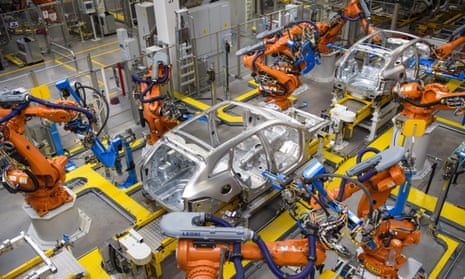
UK economy grows faster than expected after surprisingly strong June
GDP increases by 0.2% in April to June on back of recovery in car manufacturing, says ONS
The UK economy grew faster than expected in the second quarter of this year after growth was boosted by a recovery in car manufacturing and a surprisingly strong June.
UK GDP increased by 0.2% in April to June, up from 0.1% in the previous three months and the best quarterly reading in more than a year, according to the Office for National Statistics (ONS).
The data surprised economists, with a poll of them beforehand forecasting no growth in output during the quarter. The reading was helped by an unexpectedly strong performance in June, when output rose by 0.5%. GDP had fallen by 0.1% in May because of an extra bank holiday to celebrate the coronation of King Charles after growth of 0.2% in April.
However, the UK economy still remains 0.2% smaller than it was in the final quarter of 2019, before the onset of the coronavirus pandemic triggered the deepest recession on record.
The cost of living crisis period of the last 18 months remains the weakest period outside a recession for 65 years, the Resolution Foundation thinktank pointed out, despite the UK economy dodging a technical recession of two consecutive quarters of declining GDP.
Darren Morgan, an ONS director of economic statistics, said: “The economy bounced back from the effects of May’s extra bank holiday to record strong growth in June. Manufacturing saw a particularly strong month, with both cars and the often-erratic pharmaceutical industry seeing particularly buoyant growth.
“Services also had a strong month, with publishing and car sales and legal services all doing well, though this was partially offset by falls in health, which was hit by further strike action. Construction also grew strongly, as did pubs and restaurants, with both aided by the hot weather.”
The increase in output in the latest quarter was mainly driven by an increase of 1.6% in manufacturing, the ONS said. It said falling prices of materials may be “relieving some pressure on manufacturers”.
The largest positive contribution was from making transport equipment, after the Society of Motor Manufacturers and Traders reported a 16.2% increase in car manufacturing in June 2023 compared with the same month a year ago.
Carmakers endured a torrid coronavirus pandemic, as shortages of computer chips meant they were unable to produce enough cars to meet soaring demand. However, during 2023 the chip shortage has eased, allowing production to recover. UK-based manufacturers such as JLR, the maker of the Jaguar and Land Rover brands, are now working through big backlogs of orders.
Some analysts cautioned that the picture of the UK economy given by the June acceleration in output was overly flattering. The impact of the coronation bank holiday in particular “makes the economy look stronger than it really”, said Ruth Gregory, an economist at Capital Economics, a consultancy.
The cost of living crisis has been driven by the highest inflation in four decades at 11.1% in October. Inflation has gradually fallen – albeit slower than Rishi Sunak had hoped – and there was some sign of a pickup in consumer-facing services in the second quarter.
after newsletter promotion
However, the Bank of England has raised interest rates steeply to fight inflation, putting further pressure on many households, particularly those coming off fixed-rate mortgage periods.
James Smith, the Resolution Foundation’s research director, said: “The big picture is that the UK economy has expanded by just 0.4% since the start of 2022 – the weakest growth in 65 years outside a full-blown recession.
“With the economy continuing to stall, we are far from out of the cost of living crisis woods yet. Such weak growth will feel like a recession to many as families struggle with the ever-rising cost of essentials and higher mortgage repayments.”
The chancellor, Jeremy Hunt, said: “The actions we’re taking to fight inflation are starting to take effect, which means we’re laying the strong foundations needed to grow the economy.
“The Bank of England are now forecasting that we will avoid recession, and if we stick to our plan to help people into work and boost business investment, the IMF [International Monetary Fund] have said over the longer term we will grow faster than Germany, France and Italy.”
His Labour counterpart, Rachel Reeves, said: “Growth in the economy is still on the floor – 13 years of economic mismanagement under the Conservatives has left Britain worse off and trapped in a low-growth, high-tax cycle.”